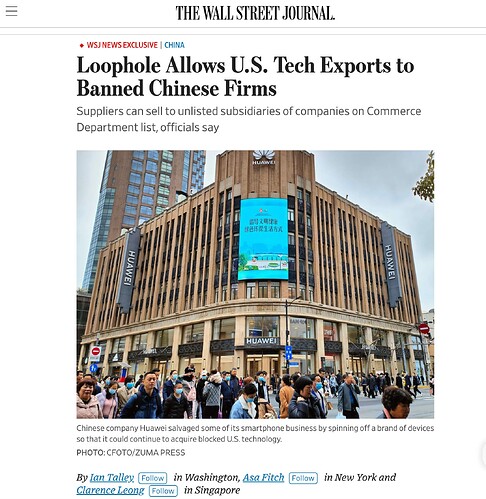-
美国本月采取行动,切断了一家中国企业集团获得西方技术的途径,但该公司仍然可以通过一个技术性问题获得这些货物,一些前高级官员说这是美国出口管制制度的一个主要漏洞。美国公司被禁止向商务部所谓的实体名单上的公司出口,除非他们得到批准。然而,被列入名单的公司仍然可以通过不在实体名单上的子公司购买美国商品。
-
这种规避出口管制的能力破坏了该政策的主要目的,即防止中国、俄罗斯和伊朗等对手利用西方先进技术增强其军事、情报和经济能力。据国防部技术安全部门的一名前高级顾问说,企业名称、个人和地址很容易迅速改变,或者建立或转让新企业,以保持所需的美国技术的流动。
-
出口管制法中的漏洞使美国技术供应商能够通过其子公司向中国公司出售产品,这说明中国作为美国的经济和地缘政治对手的出现如何使技术贸易日益成为国家安全问题。这导致美国采取措施,试图阻止对手获得西方先进技术。
-
上周,拜登政府要求视频分享应用程序TikTok的中国所有者出售其股份,否则可能面临美国对该应用程序的禁令。
-
周四,美国立法者就中国政府对该平台的影响威胁和其他国家安全问题向TikTok首席执行官周受资Shou Zi Chew提问。
-
商务部工业和安全局表示,它将中国控股公司浪潮集团有限公司列入实体名单,因为它被指控支持中国的军事现代化努力。
-
一些美国公司计划继续向浪潮集团的子公司运送货物,除非商务部有任何相反的指示。
-
与美国财政部的制裁不同,美国商务部实体名单的法律允许公司向未被明确点名的公司进行销售。
-
工业和安全局目前正在考虑将浪潮的一些单位加入其实体名单。
-
立法者们正在更广泛地研究如何缩小不同出口管制和制裁制度之间的差距
-
安迪-巴尔议员(R., Ky.)在本月的众议院外交事务委员会听证会上表示,财政部的制裁名单、商务部的实体名单和对外国投资的限制需要协调。
-
在中国政府以国内技术取代外国技术的努力中,浪潮一直是至关重要的,特别是在与国家安全有关的部门。它与中国国防科技大学合作,支持中国警察的监控系统。在浪潮被列入实体名单的第二天,Nvidia的首席财务官表示,该公司将在该地区寻找其他合作伙伴。
-
浪潮集团最大的上市子公司浪潮电子信息产业有限公司宣布,计划将其总部地址从黑名单上的母公司变更过来。美国供应商在向与实体名单上的公司有共同地址的公司出口前必须进行尽职调查。失去从美国供应商那里获得高端芯片的机会,对浪潮来说将是一个重大挫折。华为技术有限公司也在2019年被列入商务部的实体名单,并通过分拆其荣誉品牌的设备挽救了一些智能手机业务。荣耀并不在实体名单上。
-
北京的官员批评了美国限制西方技术销售的政策,称其滥用了出口管制。美国工业界和政府官员警告说,出口管制政策的制定应在保护先进技术的同时,确保美国公司不会失去全球市场份额和收入。商务部副部长采取了积极的姿态,将160家中国公司和个人列入实体名单。
-
The U.S. moved this month to cut off a Chinese conglomerate’s access to Western technology, but the firm can still secure those goods through a technicality that some former senior officials say is a major loophole in the U.S. export-control regime. U.S. companies are barred from exporting to companies named on the Commerce Department’s so-called Entity List, unless they get approval. However, listed companies can still buy U.S. goods through subsidiaries that aren’t on the Entity List.
-
This ability to sidestep export controls undermines the primary purpose of the policy, which is to prevent adversaries such as China, Russia and Iran from empowering their military, intelligence and economic capabilities with advanced Western technology. According to a former senior adviser at the Department of Defense’s technology security unit, business names, individuals and addresses are easily and quickly changed or new businesses established or transferred to maintain the flow of needed U.S. technologies.
-
The loophole in export-control laws that enables U.S. technology suppliers to sell to Chinese companies via their subsidiaries illustrates how China’s emergence as an economic and geopolitical adversary of the U.S. has increasingly turned technology trade into a national-security matter. This has caused the U.S. to take measures to try and prevent adversaries from gaining access to advanced Western technology.
-
Last week, the Biden administration demanded that the Chinese owners of the video-sharing app TikTok sell their stakes or face a possible U.S. ban of the app
-
On Thursday, U.S. lawmakers questioned TikTok Chief Executive Shou Zi Chew about the threat of Chinese government influence over the platform and other national-security concerns
-
The Commerce Department’s Bureau of Industry and Security said it added Chinese holding company Inspur Group Co. to the Entity List for its alleged support of China’s military modernization efforts
-
Some U.S. firms plan to continue shipping goods to Inspur’s subsidiaries, barring any guidance to the contrary from Commerce
-
Unlike sanctions levied by the U.S. Treasury Department, the law governing the Commerce Department’s Entity List permits companies to sell to firms that aren’t specifically named
-
The Bureau of Industry and Security is now considering adding some of Inspur’s units to its Entity List
-
Lawmakers are looking more broadly at closing the gaps among the different export-control and sanctions regimes
-
Rep. Andy Barr, (R., Ky.) said at a House Foreign Affairs Committee hearing this month that the Treasury sanction rolls, Commerce’s Entity List and restrictions of foreign investments need to be coordinated
-
Inspur has been essential in the Chinese government’s efforts to replace foreign technologies with domestic ones, especially in sectors related to national security. It has collaborated with China’s National University of Defense Technology and supported surveillance systems of the Chinese police. The day after Inspur was added to the Entity List, Nvidia’s CFO said the company would be looking for other partners in the region.
-
Inspur’s largest publicly traded subsidiary, Inspur Electronic Information Industry Co., announced plans to change its head-office address from its blacklisted parent. U.S. suppliers must undertake due diligence before exporting to firms that share a common address with a company on the Entity List. Losing access to high-end chips from U.S. suppliers would be a major setback to Inspur. Huawei Technologies Co. was also placed on the Commerce Department’s Entity List in 2019, and salvaged some of its smartphone business by spinning off its Honor brand of devices. Honor isn’t on the Entity List.
-
Officials in Beijing have criticized the U.S. policies restricting sales of Western technology, calling them an abuse of export controls. The U.S. industry and government officials warn that export-control policy should be crafted to protect advanced technology while also ensuring American companies don’t lose global market share and revenue. The Commerce Undersecretary has taken an aggressive posture in adding 160 Chinese firms and individuals to the Entity List.
